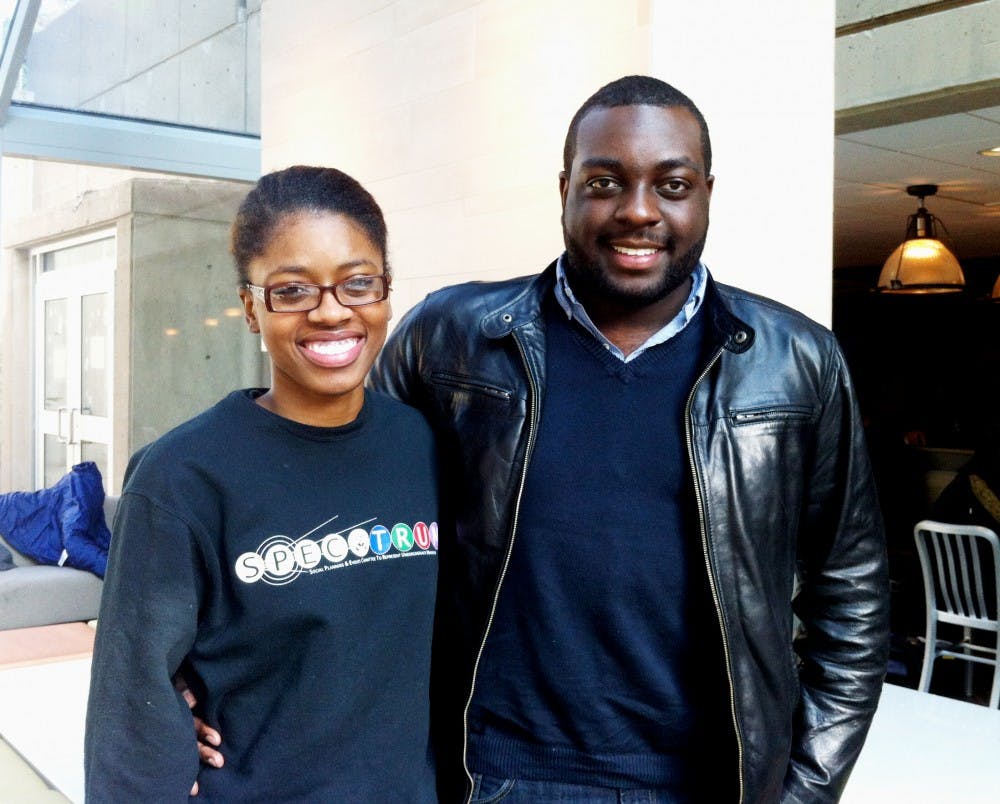
College Juniors Abrina Hyatt and Denzel Cummings are the new leaders of UMOJA. They plan to address financial aid complexities and the stigma surrounding mental illness.
UMOJA — the umbrella organization for black student groups on campus — just elected College juniors Abrina Hyatt and Denzel Cummings as its new planning and facilitating co-chairs on Monday night. Hyatt will be serving her second term as co-chair, while Cummings was previously the admissions chair. The Daily Pennsylvanian sat down with both of them to discuss their plans for the upcoming year.
The Daily Pennsylvanian: Why did you decide to run for the position of UMOJA planning and facilitating co-chair?
Abrina Hyatt: I ran again because I felt like when I started out, I had a lot of goals for what I wanted to see for UMOJA. I also pictured myself doing it for two years … What I was doing this year had a lot to do with engaging constituents more. For the next year, I wanted to continue to build our network but also to build relationships more with other coalitions.
Denzel Cummings: For me, I had the opportunity to serve as admissions chair last year, and that was an excellent experience … I realized how much of an impact the 5B and also other boards [have] on campus … I want to give more to UMOJA so that’s why I ran.
Related: UMOJA Week brings history to the future
DP: What have you learned from your experience this past year that you can bring to this upcoming year?
AH: I learned that communication is essential in all areas of any type of relationship … so whether you’re communicating with your board, your constituency, administrators … or any other people involved in the Penn community, it’s just important to make sure that you’re honest with yourself and the people that you’re working with.
Over time, if there’s a lack of communication, the impact … can be weakened.
DC: I’ve learned throughout my term that while you may not feel that you have much of an impact, if you speak up and your voice is heard, then the administration [will] truly care about the things you have to say and will try to work with students to make sure that student voices are heard in deliberations about certain issues.
Related: UMC celebrates 35th year anniversary with gala
DP: What are some challenges that UMOJA faces?
AH: One of the things the board faces is making sure that the people we’re serving actually know what our purpose is. Even though we have representatives from all of our constituents coming to general body meetings to get information, sometimes [it’s difficult to ensure that] the dissemination of information takes place.
DC: I feel that with financial aid, that’s often a struggle that we have and something that we don’t necessarily know how to navigate. Financial aid is a complex issue in making sure that the financial aid department understands some of the situations that we struggle with as a community.
AH: One other thing is the stigma that surrounds mental health. For a lot of students in the African diaspora, going to Counseling and Psychological Services would be something that might be seen by families as not necessarily beneficial … that’s something that a lot of black students have to deal with even though CAPS is an excellent resource.
Related: Multicultural Greek Council elects new president
DP: How do you plan to overcome these challenges?
AH: A lot of how we deal with it is going to have to come from gathering more information from [constituents] and [about] financial aid … and what [the University’s] efforts are in making sure that students who want to come to Penn and who deserve to be here actually have the means to do so. Once we understand the information and the facts about the situation, then we will move forward with figuring out how to make things better for black students.
DC: Something we’re planning on doing to unite constituent voices is to have a forum twice a semester that will essentially break down some of the conversations that we’re having with administrators.
We would leave it open for our constituents — not only people of constituent representing groups but also constituents of the entire Penn African American community — to discuss how to go about these issues and to fine-tune our answers to questions based on feedback that we’re getting from our entire community.
The Daily Pennsylvanian is an independent, student-run newspaper. Please consider making a donation to support the coverage that shapes the University. Your generosity ensures a future of strong journalism at Penn.
DonatePlease note All comments are eligible for publication in The Daily Pennsylvanian.







